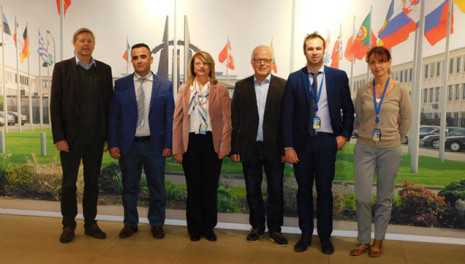NATO launches first scientific cooperation initiative with Algeria
Szöveg: honvedelem.hu / nato.int | 2017. november 1. 9:00For the first time, the NATO Science for Peace and Security (SPS) Programme is supporting a multi-year research project with Algeria. The new activity will develop an innovative detection system to help in the fight against terrorism while engaging key partners in practical cooperation.

Experts involved in the SPS project “Implementation of a Terahertz Imaging and Detection System" gathered at NATO Headquarters to kick off the innovative scientific project between NATO and Algeria
Kicked off at NATO Headquarters on 26 October 2017, the new project brings together the Université Savoie Mont Blanc (France), Ecole Militaire Polytechnique (Algeria) and KTH Royal Institute of Technology (Sweden) to work on the design and development of a terahertz (THz) imaging and detection system. This new system will be able to detect hazardous objects like concealed weapons or explosives and will help to secure vulnerable places from terrorist threats, such as airports, railway stations, critical infrastructure as well as government buildings.
“THz frequency range is a scientific field that has seen rapid technological advances and growth in interest for its potential application in a number of domains, ranging from security, imaging, detection, and product inspection to chemical spectroscopy, astronomy, telecommunication, material characterisation and medical applications," said Professor Jean-Louis Coutaz from Université Savoie Mont Blanc, which is leading this research initiative.
The kick-off meeting marked the start of the project which will strengthen ties between NATO, France and two partner countries, Algeria and Sweden, through practical cooperation. By providing cutting-edge technological solutions in support of the fight against terrorism, this SPS project is also contributing to NATO’s wider efforts to project stability beyond Alliance borders. It also represents an important milestone in NATO’s engagement with partners in the south. “By building expert networks, north to south, this activity will help to develop scientific skills and technology to counter emerging threats," said Professor Fredrik Laurell from Sweden.
The new system is to be installed at the Ecole Militaire Polytechnique of Bordj El Barhri, Algeria. In the long run, this experimental set-up will provide an important basis for further scientific research in this field in Algeria. “This SPS project, for the first time, will provide terahertz imaging capabilities for Algeria. This will enable scientific research in this field, fostering a generation of young scientists from Algeria," said Dr Deniz Beten, Senior SPS and Partnership Cooperation Advisor. Dr Mohamed Lazoul, from Ecole Militaire Polytechnique and SPS Project Co-Director, stated that “the system will improve the capability of our institution in this cutting-edge technology and will allow significant sharing of expertise and know-how in the field of terahertz imaging detection, that will be a key technology in support of the fight against terrorism in the years to come."
NATO’s SPS Programme is supporting practical cooperation between the Alliance and partner countries in civil science, technology, innovation and knowledge exchange.